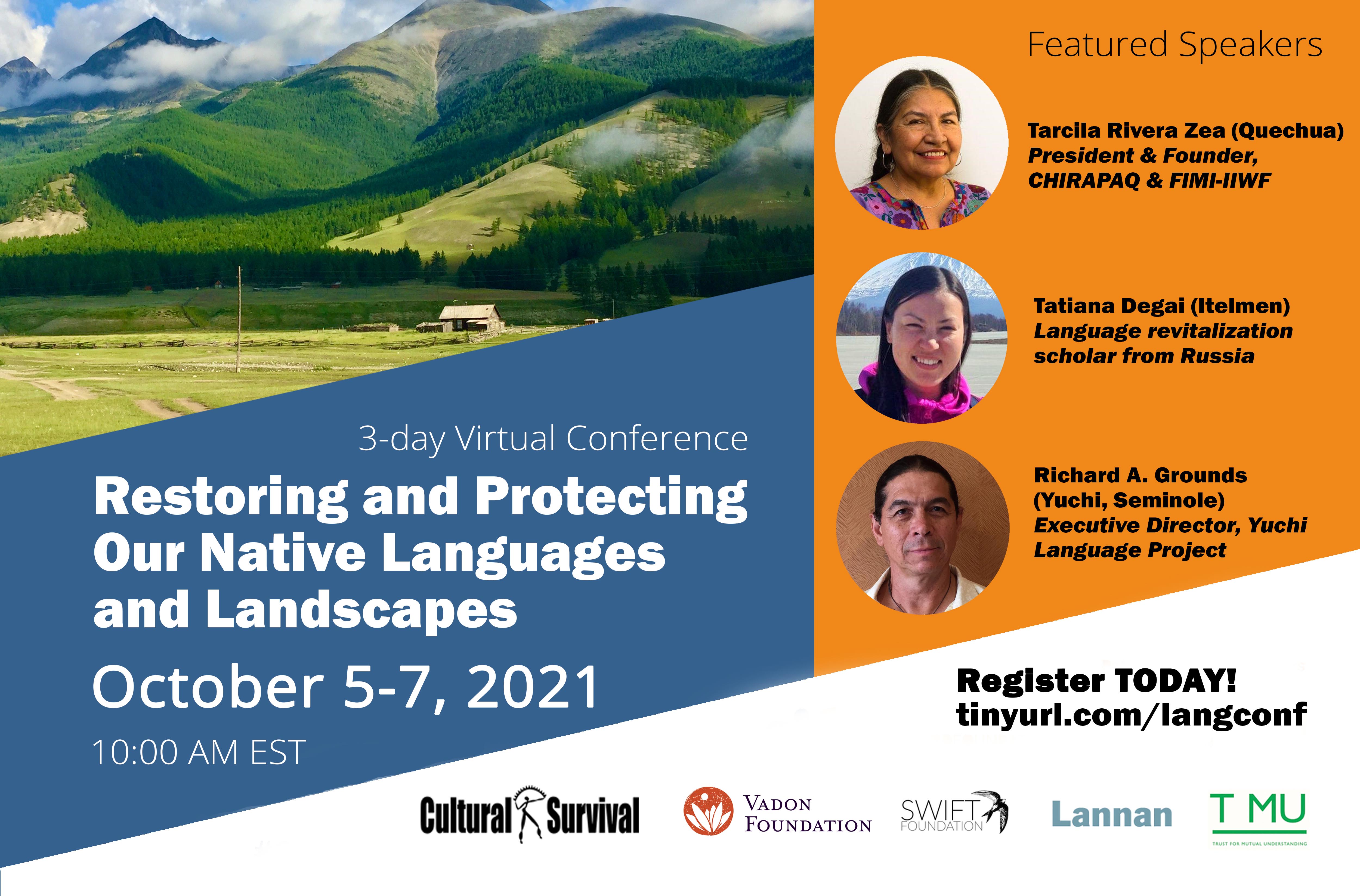
Cultural Survival Announces Virtual Conference on Restoring and Protecting Indigenous Languages and Landscapes
CAMBRIDGE, MA / AGILITYPR.NEWS / September 29, 2021 / On October 5-7, 2021, in light of the upcoming UN International Decade of Indigenous Languages, Cultural Survival announces its virtual conference "Restoring and Protecting Our Native Languages and Landscapes.” The Indigenous-led NGO is organizing a 3-day virtual conference that will convene conversations and knowledge-sharing around best practices for the revitalization and strengthening of endangered Indigenous languages and the Traditional Ecological Knowledge carried within them.
It is estimated that Indigenous territories contain 80 percent of the Earth’s biodiversity. The world’s remaining biodiversity hotspots are also home to around 70 percent of all languages spoken on Earth, showing strong geographic co-occurrence of Indigenous language speakers and biodiversity. According to the UNESCO Atlas of the World’s Languages in Danger, between 1950 and 2010, 230 languages went extinct and 50-90 percent of them are predicted to disappear by the next century. Today, a third of the world’s languages have fewer than 1,000 speakers. Every two weeks, a language dies with its last speaker.
The key to understanding the correlation between Indigenous languages and biodiversity is their relationship with Mother Earth. As Kanen’tó:kon Hemlock (Mohawk) said during the launch event for the 2019 International Year of Indigenous Languages: “As Indigenous people, our languages are those of the Earth, and it is those languages that we use to speak with our mother. The health of our languages is connected to the health of the Earth.”
Indigenous leadership is essential to the success of the UN Decade of Indigenous Languages, which begins in 2022. “The bottom line of focusing on Indigenous languages is about growing new speakers of our highly endangered languages. It is not about documenting our languages as an end in itself, as part of an ongoing project of intellectual colonialism that has been little changed within the discipline of linguistics for the last two centuries. This makes linguistics perhaps the most colonial academic discipline on the face of the planet, that has failed to respond to the push for Indigenous rights, Indigenous cultures, and for Indigenous languages to be respected on their own terms,” says Dr. Richard A. Grounds (Yuchi and Seminole), language activist, Chair of the Global Indigenous Languages Caucus, and panelist for Cultural Survival’s language conference.
“At Cultural Survival, we recognize that Indigenous Peoples themselves must lead the revitalization efforts and claim ownership of their languages and cultures. This conference will equip individuals working at the community level with tools for language revitalization by joining leaders from different parts of the globe working on these issues,” said Galina Angarova (Buryat), Cultural Survival Executive Director.
Joining the conference are over 26 Indigenous linguists, educators, and practitioners working in the field of Indigenous language revitalization. Featured panelists include: language revitalization scholar Tatiana Degai (Itelmen) from Russia; Vice President of the Network of Indigenous Communicators of Peru Rosa Palomino Paucar (Aymara); language revitalizer and Co-director of Ekvn-Yefolecv Maskoke Ecovillage Marcus Briggs-Cloud (Maskoke); Executive Director of the Yuchi Language Project Richard Grounds (Yuchi, Seminole); and Founder of Munanai and language activist Toroga Denver Breda (Khoikhoi) from South Africa, among others. Discussions will demonstrate why language revitalization and biodiversity protection are inextricably linked, and present methodologies, practical ideas, and solutions for the best ways to carry forward the work of revitalizing, protecting, and sustaining language, culture, and land holistically. This virtual event is free and open to the public thanks to the generous support of the Lannan Foundation, Swift Foundation, Vadon Foundation, and Trust for Mutual Understanding. Cultural Survival encourages language activists and practitioners working in the field of language revitalization to join.
To register and for a list of speakers and an agenda please visit Cultural Survival's website.
About Cultural Survival
Cultural Survival (CS) is an Indigenous-led NGO and U.S. registered non-profit that advocates for Indigenous Peoples' rights and supports Indigenous communities’ self-determination, cultures, and political resilience, since 1972. For over 49 years, Cultural Survival has partnered with Indigenous communities to advance Indigenous Peoples' rights and cultures worldwide. CS envisions a future that respects and honors Indigenous Peoples' inherent rights and dynamic cultures, deeply and richly interwoven in lands, languages, spiritual traditions, and artistic expression, rooted in self-determination and self-governance. The core of Cultural Survival’s efforts rests on the principles of supporting, amplifying efforts, and raising awareness of self-determination for Indigenous communities. To learn more, visit www.cs.org

Contacts
Agnes Portalewska
Cultural Survival Communications Manager
agnes@cs.org2067 Massachusetts Ave. Cambridge, MA 02140
Phone: 857-389-2516
www.cs.org